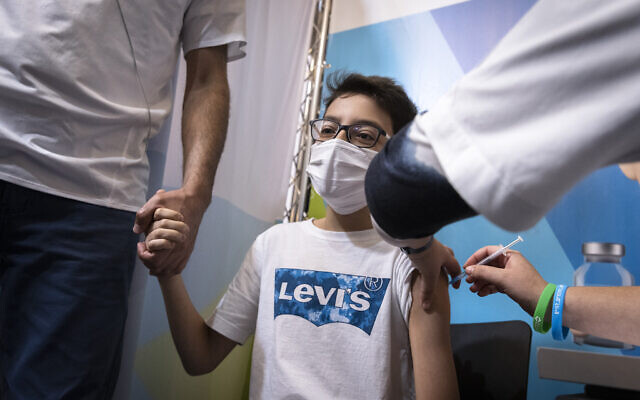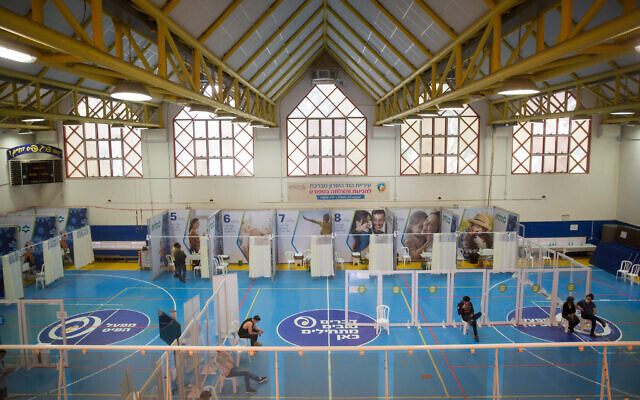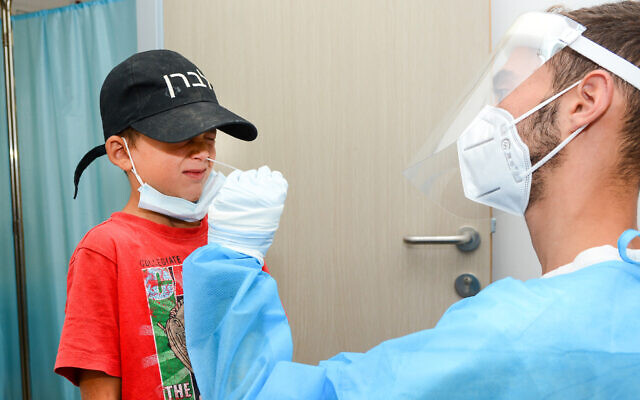Researchers analyzing Clalit data of over 94,000 vaccinated adolescents and the same number of unimmunized finds those who got the shot are 90% less likely to get the coronavirus

An analysis of nearly 200,000 Israeli adolescents shows Pfizer-BioNTech’s coronavirus vaccine to be 93 percent effective at stopping symptomatic COVID-19 infections and nearly as good at keeping the Delta variant of the virus at bay altogether, researchers said late Wednesday.
The study, conducted by researchers from Israel’s Clalit health maintenance organization, Harvard University and Boston Children’s Hospital, compared 94,354 vaccine recipients between the ages of 12 and 18 with the same number of unvaccinated individuals from the same age group.
It was conducted while the Delta variant was the dominant strain of the coronavirus in Israel, leading the researchers to conclude that the vaccine was as effective in youths against the mutation as it was against earlier versions.
“Our results show that the BNT162b2 mRNA vaccine was highly effective in the first few weeks after vaccination against both documented infection and symptomatic Covid-19 with the delta variant among adolescents between the ages of 12 and 18 years,” the researchers wrote in a letter to the New England Journal of Medicine, which included the data.
According to the analysis, adolescents who got the vaccine between June 8 and September 14 were 59% less likely than those in an unvaccinated control group to contract the coronavirus two weeks after getting the first dose and 57% less likely to show symptoms of COVID-19. Those figures went up to 90% and 93% respectively a week after getting the second dose of the shot, the study found.
The authors noted that Delta variant was responsible for over 95% of all infections in Israel during the trial period.
The study was conducted using data from Clalit, which is Israel’s largest HMO and serves over half its population.

Individuals receiving vaccines were matched with an unvaccinated control, based on age, sex, race or community affiliation, geographic location and various medical risk factors. Out of the nearly 95,000 vaccinated adolescents studied, only 11 had symptoms of COVID-19 a week to three weeks after getting the second dose, compared to 151 in the unvaccinated cohort.
Only three hospitalizations were recorded among the entire group of over 188,000 studied, including one fully vaccinated individual, and there were no severe illnesses or deaths.
The data appears to confirm that the Pfizer-BionTech vaccine is as effective against the Delta variant among teens as against previous strains, the authors wrote.
“Our estimates of the effectiveness of two doses of the BNT162b2 vaccine against the delta variant among adolescents are similar to estimates of effectiveness against the alpha variant in the general population with the use of the same study design,” the letter read.
The remarkably high effectiveness (VE) of vaccination for teens vs the Delta variant in over 94,000 vaccinees and 94,000 matched controls: 93% VE vs symptomatic infection (95% CI 88,97) https://t.co/wwoXlw7PH9@NEJM pic.twitter.com/8m3fJ7avc5
— Eric Topol (@EricTopol) October 20, 2021
A previous study of patients in England published in August found that the vaccine was nearly as effective against the Delta variant as against the Alpha strain among all age groups. However, this appeared to be first large-scale study of adolescents looking at vaccine effectiveness against the Delta strain.
Some in Israel had initially feared that the vaccine was less effective against the Delta mutation as a sharp spike in cases over the summer coincided with the variant reaching the country.
However, Israeli researchers have since concluded that fading immunity from the initial doses of the shot was responsible, launching a massive booster immunization campaign.

Israeli officials have raised concerns in recent days about the arrival of a new subvariant called AY4.2. On Wednesday, Prime Minister Naftali Bennett ordered that the new strain be closely monitored, after meeting with top health officials.
According to Health Ministry data Wednesday, nearly 75% of Israeli teens age 16 to 19 have received at least two doses of the Pfizer-BionTech vaccine, which is essentially the only shot available in Israel. Among those 12-15, the number is only 44% however.
Youths aged 19 and under have been responsible for over 20 percent of all infections since the start of the pandemic, though they make up a tiny percentage of those with symptomatic or serious cases.
As reported by The Times of Israel
